Related Research Articles
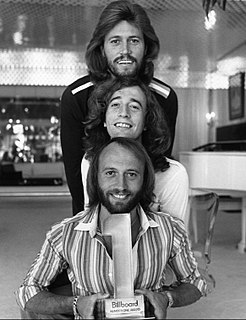
The Bee Gees were a music group formed in 1958, featuring brothers Barry, Robin and Maurice Gibb. The trio were especially successful as a popular music act in the late 1960s and early 1970s, and later as prominent performers of the disco music era in the mid- to late 1970s. The group sang recognisable three-part tight harmonies; Robin's clear vibrato lead vocals were a hallmark of their earlier hits, while Barry's R&B falsetto became their signature sound during the mid- to late 1970s and 1980s. The Bee Gees wrote all of their own hits, as well as writing and producing several major hits for other artists and have been regarded as one of the most important and influential acts in pop music history. They have been referred to in the media as The Disco Kings, Britain's First Family of Harmony, and The Kings of Dance Music.

Maurice Ernest Gibb was a British musician, singer, songwriter and record producer who achieved fame as a member of the Bee Gees. Although his elder brother Barry Gibb and fraternal twin brother Robin Gibb were the group's main lead singers, most of their albums included at least one or two songs featuring Maurice's lead vocals, including "Lay It on Me", "Country Woman" and "On Time". The Bee Gees were one of the most successful pop-rock groups of all time.

Sir Barry Alan Crompton Gibb is a British musician, singer-songwriter, and record producer who rose to worldwide fame as a member of the Bee Gees, one of the most commercially successful groups in the history of popular music. With his younger brothers, fraternal twins Robin and Maurice Gibb, he formed a songwriting partnership beginning in 1955. He has lived in Britain, Australia, and the United States, holding dual UK–US citizenship, the latter since 2009.

Cucumber Castle is the seventh studio album by the Bee Gees, released in April 1970. It was produced by Barry Gibb, Maurice Gibb, and Robert Stigwood. It consists of songs from their television special of the same name, which was named after a song on their 1967 album Bee Gees' 1st. Cucumber Castle is the only Bee Gees album not to feature any recorded contributions from Robin Gibb, as he had left the group before the album was recorded.
Stephen Alan Kipner is an American-born Australian songwriter and record producer, with hits spanning a 40-year period, including chart-topping songs such as Olivia Newton-John's "Physical", Natasha Bedingfield's "These Words", and Christina Aguilera's "Genie in a Bottle", for which he won an Ivor Novello Award for International Hit of the Year. Other hits he wrote include Chicago's "Hard Habit to Break", 98 Degrees' "The Hardest Thing", Dream's "He Loves U Not", Kelly Rowland's "Stole", The Script's "Breakeven" and "The Man Who Can't Be Moved", American Idol Kris Allen's top 5 debut "Live Like We're Dying", Cheryl Cole's "Fight for This Love", Camila Cabello's "Crying in the Club" and James Arthur's "Say You Won't Let Go".
Tin Tin was a pop rock band, which first formed in Australia as The Kinetics in 1966. They relocated to the United Kingdom in 1969 and were renamed as Tin Tin, which comprised Steve Kipner, Steve Groves, John Vallins and Geoff Bridgford (drums). In 1970 they issued a single, "Toast and Marmalade for Tea", which was a No. 10 hit on the Go-Set National Singles Chart in June the following year. It reached No. 20 in the United States on the Billboard Hot 100. Their next single, "Is That the Way?" (1971), peaked at No. 59 on the Billboard Hot 100.
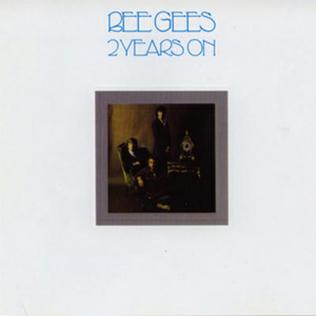
2 Years On is the eighth studio album by the Bee Gees, which reached No. 32 on the US charts. Released in 1970, the album saw the return of Robin Gibb to the group after an earlier disagreement and subsequent split following Odessa. 2 Years On was the first album with drummer Geoff Bridgford, who remained a full-time member of the group until 1972 although he was not pictured on the sleeve. The best-known track is "Lonely Days". Released as the first single by the reunited brothers, it charted high in the US, but peaked at No. 33 in the United Kingdom.
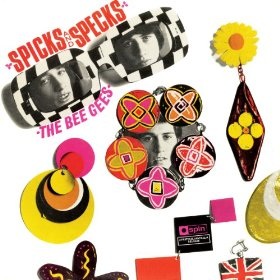
Spicks and Specks is the second studio album by the Bee Gees. It was released in November 1966, on Spin. Primarily written by Barry Gibb, the album features the first Robin Gibb composition "I Don't Know Why I Bother With Myself" and a Maurice Gibb composition "Where Are You".

"Toast and Marmalade for Tea" is a song by the Australian rock group Tin Tin, and was written by Steve Groves and produced by Maurice Gibb. It was a Top 20 U.S. hit in 1971.
"I Can't See Nobody" is a song by the Bee Gees, released first as the B-side of "New York Mining Disaster 1941". With "New York Mining Disaster 1941", this song was issued as a double A in Germany and Japan., and included on the group's third LP, Bee Gees' 1st. "I Can't See Nobody" charted for one week at number 128 on the Billboard Bubbling Under the Hot 100 in July 1967.

"All of My Life" is a song by the English-Australian rock group Bee Gees, written and sung by Barry Gibb, which was used as the B-side of "Monday's Rain". This song was recorded during the sessions for their second album Spicks and Specks and appeared on the early pressings of the album, entitled Monday's Rain as the first song on side two. When the album's name was changed to Spicks and Specks, the song was omitted.
"Bury Me Down By the River" is a song written by Barry and Maurice Gibb and recorded separately by the Bee Gees and P.P. Arnold. The Bee Gees' version was recorded in May 1969 at IBC Studios and released in April 1970 on the album Cucumber Castle.
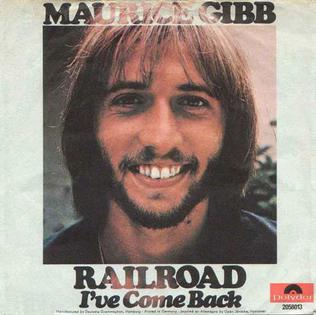
"Railroad" is the first solo single released by Maurice Gibb, best known as a member of the Bee Gees. It was released in April 1970. Like the Bee Gees' songs from 1967 to 1972, the single was released by Polydor in most parts of the world while in the US and Canada it was released by Atco. In Canada it was also released by Atlantic and Cotillion. Gibb did not release a follow-up single until 1984 when he released "Hold Her in Your Hand".
The Loner is an album recorded in late 1969 by Maurice Gibb of the Bee Gees. An album master was compiled on 14 November 1970, but to date The Loner remains unreleased. Bootleg releases with the same title collect additional recordings unrelated to this album.
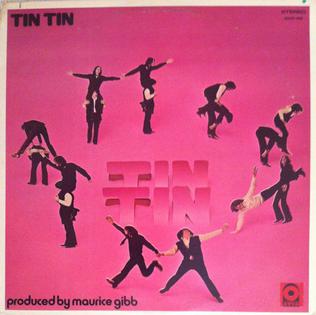
"Tin Tin" is the first studio album by the Australian group Tin Tin, produced by Maurice Gibb.
The Bloomfields were an English rock band formed in 1970 by Maurice Gibb, Billy Lawrie and Johnny Harris.
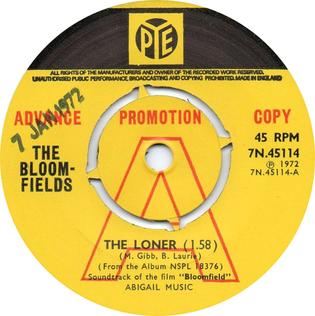
"The Loner" is a song written by Maurice Gibb and Billy Lawrie and originally included on Gibb's The Loner which was not released, although British rock band The Bloomfields covered the song and their version was released internationally, featuring a lead vocal of Billy Lawrie and Maurice Gibb, with Gibb on guitars and bass. They recorded this song for the film Bloomfield, but the film was called The Hero in America. The song starts with a drum fill. Gibb and Lawrie sang together in harmony on the line I'm a loner. On the record, Billy Lawrie was credited as 'B. Laurie'.
"Everybody Clap" is a song written by Maurice Gibb and Billy Lawrie, and was released by Lulu. The single's B-side was "After the Feeling is Gone" in UK and "Goodbye My Love Goodbye" in US. And this single was released in Atlantic Records in UK and Atco Records in US.
"Town of Tuxley Toymaker, Part One" is a song written by Barry, Robin and Maurice Gibb in Australia in 1966. It was recorded by Jon Blanchfield in 1966, Billy J. Kramer in 1967 and Shane in 1968.

"Have You Heard the Word" is a song attributed to The Fut. Written by Steve Kipner and Steve Groves, it is the band's only single. Most of the vocals were sung by Maurice Gibb, in the style of John Lennon. The B-side "Futting" was an instrumental. It was released as a single on 7 March 1970 but did not chart.
References
- ↑ Twist in the Dark: Lulu - the songwriter. Accessed 22 March 2013
- ↑ Brennan, Joseph. "Gibb Songs: 1970" . Retrieved 22 March 2013.
- ↑ Brennan, Joseph. "Gibb Songs: 1969" . Retrieved 22 March 2013.